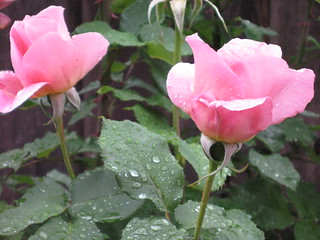Fall Preparation: Rainwater Harvesting Options for Homeowners
 From our years of experience landscaping Lake Oswego and Portland, we can tell you that rainwater harvesting systems are highly beneficial, even in a moist climate like the Pacific Northwest. Yes, for much of the year rainwater harvesting systems in Portland-area homes will over-collect. At these times, the excess water can be diverted onto a permeable surface, where it will drain away slowly into the city watershed. Even during these wet periods, harvesting does help benefit the local eco system by slowing the drainage of rainwater to the river.
From our years of experience landscaping Lake Oswego and Portland, we can tell you that rainwater harvesting systems are highly beneficial, even in a moist climate like the Pacific Northwest. Yes, for much of the year rainwater harvesting systems in Portland-area homes will over-collect. At these times, the excess water can be diverted onto a permeable surface, where it will drain away slowly into the city watershed. Even during these wet periods, harvesting does help benefit the local eco system by slowing the drainage of rainwater to the river.
Benefits of Rainwater Harvesting
When water speeds to the Willamette River along city streets, it picks up contaminants such as motor oil, antifreeze and heavy metals shed by cars. Far fewer pollutants are picked up when water trickles slowly down through the soil. Rainwater harvesting is a practice that helps slow down this flood of water to the river, allowing more pollutants to be filtered out along the way.
Care for the environment is a strong motivator for installing rainwater harvesting systems. More and more homeowners in Portland are doing their part to clean up our river. Over the last 10 years, the Willamette has improved dramatically. We see more wildlife in and around the river than ever before. Rainwater harvesting and other solutions – such as permeable driveways, patios and walkways that allow rainwater to move through the natural watershed instead of racing down to the river on manmade surfaces – matter because they reduce the amount of pollutants we dump into our local streams and rivers.
Of course, a rainwater harvesting system is beneficial for homeowners as well as the local watershed. We do have dry months in the Pacific Northwest, and rainwater harvesting can help reduce your summer water bills. Another benefit: Many gardeners prefer rainwater to city water, which typically contains more chemicals.
Rainwater Harvesting Options
If you want to join the rainwater harvesting revolution, here are a few basic system requirements and setup options:
Storage. First, you’ll need a storage container for the water you collect, whether that’s a cistern or barrels. It’s easy to start with a single barrel holding 55-65 gallons. You can string these together as you add more water storage. Or, if you’re ready to “go big,” you can install a larger cistern, or underground tanks which could hold up to many hundreds or even thousands of gallons. The barrel or cistern should be located near your home, in a spot where it will be easy to divert water from the gutters. The area should be stable and level. A gravel surface is popular for barrels, while a sturdier concrete pad is preferred for larger cisterns. Larger underground storage tanks can be placed in areas with easy access for the initial excavation work.
Diverter. Next, you need a way to divert rainwater from the roof to your tank. The diverter should have a filter system and ideally a way to divert the “first flush” of rainwater off the roof, which will contain contaminants. Piping will be needed to run from the roof collection device to the rain barrel or system. Add a spigot near the bottom of the barrel or cistern and a diverter for an over-full tank, and you have yourself a rainwater harvesting system.
Extras. Once you have a basic system in place, you can add a few bells and whistles, such as lovely chime drainage chains and solar pumps. You’ll need a pump to send water from your rain barrel or cistern through a hose. Solar pumps are great because they eliminate the homeowner’s dependence on external power sources. (There’s definitely an “off-the-grid” appeal to rainwater harvesting systems.)
If you’re looking for someone to handle your rainwater harvesting and other needs related to landscaping, Lake Oswego and Portland residents can contact Landscape East & West for help. We have years of experience installing and maintaining rainwater harvesting systems in the Portland and Lake Oswego area.
[Photo by: IrisDragon, via CC License]
